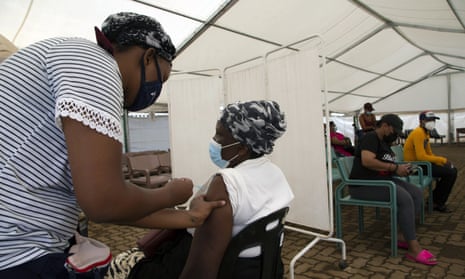As the world scrambles to contain the new variant, some are hopefully seizing on anecdotal reports from South Africa that it may cause only mild illness. But although previous variants of the coronavirus have been associated with different symptoms and severity, it would be dangerous to assume that Omicron is a viral pussy cat, experts say.
At a briefing convened by South Africa’s Department of Health on Monday, Unben Pillay, a GP from practising in Midrand on the outskirts of Johannesburg, said that while “it is still early days” the cases he was seeing were typically mild: “We are seeing patients present with dry cough, fever, night sweats and a lot of body pains. Vaccinated people tend to do much better.”
Meanwhile, Pretoria-based GP Dr Angelique Coetzee said many of the patients she’d seen were presenting with unusual symptoms, particularly severe tiredness, and none were reporting loss of taste or smell.
While it may take several weeks before we get any definitive answers regarding the nature of the threat posed by Omicron, early evidence is emerging that vaccines do offer at least some protection. Dr Wassila Jassat from the National Institute for Communicable Diseases said that in the South African city of Tshwane, where Omicron was detected, 87% of hospital admissions were among unvaccinated patients.
Rudo Mathivha, head of intensive care at Chris Hani Baragwanath, the main hospital in Soweto, painted a similar picture at a briefing on Saturday. “We’re seeing a marked change in the demographic profile of patients with Covid-19,” Mathivha said. “Young people, in their 20s to just over their late 30s, are coming in with moderate to severe disease, some needing intensive care. About 65% are not vaccinated and most of the rest are only half-vaccinated.”
However, these demographic differences could simply be a factor of vaccination rates: 64% of over-60s in South Africa have had at least one dose, compared with only 26% of those aged between 18 and 34.
Reassuring as such anecdotes may be, they should be treated with caution. Dr Müge Çevik, a clinician in infectious diseases at the University of St Andrews, said: “All the statements about severity of Omicron – either in the direction of more severe, or milder – are unreliable at this point as they are based on anecdotes or very little data. Even results from the first epidemiological studies will likely be biased as there are major challenges when inferring causality of disease severity with new variants – especially now that many people have acquired immunity, either via vaccination or infection.”
On the other hand, we know from previous iterations of the virus that different variants can trigger more or less severe disease, and varying symptoms. For instance, Alpha (first detected in the UK) was more transmissible and associated with more severe disease compared to earlier variants but the symptoms were broadly similar. Delta (first detected in India) is even more transmissible and deadly, and yet two of the cardinal Covid symptoms: persistent cough and loss of smell and taste, are less common, but more people report headaches and/or runny noses.
One reason for such differences could be changes in the way the virus interacts with our immune cells. Many common symptoms of illness, such as fever or a runny nose, are primarily caused by our immune responses to infections rather than direct damage by viruses or bacteria. Differences in our immune responses may also explain why two individuals don’t necessarily experience the same symptoms if infected with the same virus or variant.
“All of this is about variations in bits of the genome that result in changes to the proteins that the virus uses when it gets into our bodies,” said Prof Lawrence Young, a virologist at the University of Warwick. “In the same way that the variants have different impacts on our immune system, and therefore the concerns we have about vaccine effectiveness, some of those same effects can influence the way our bodies respond to the virus and the symptoms we have.”
